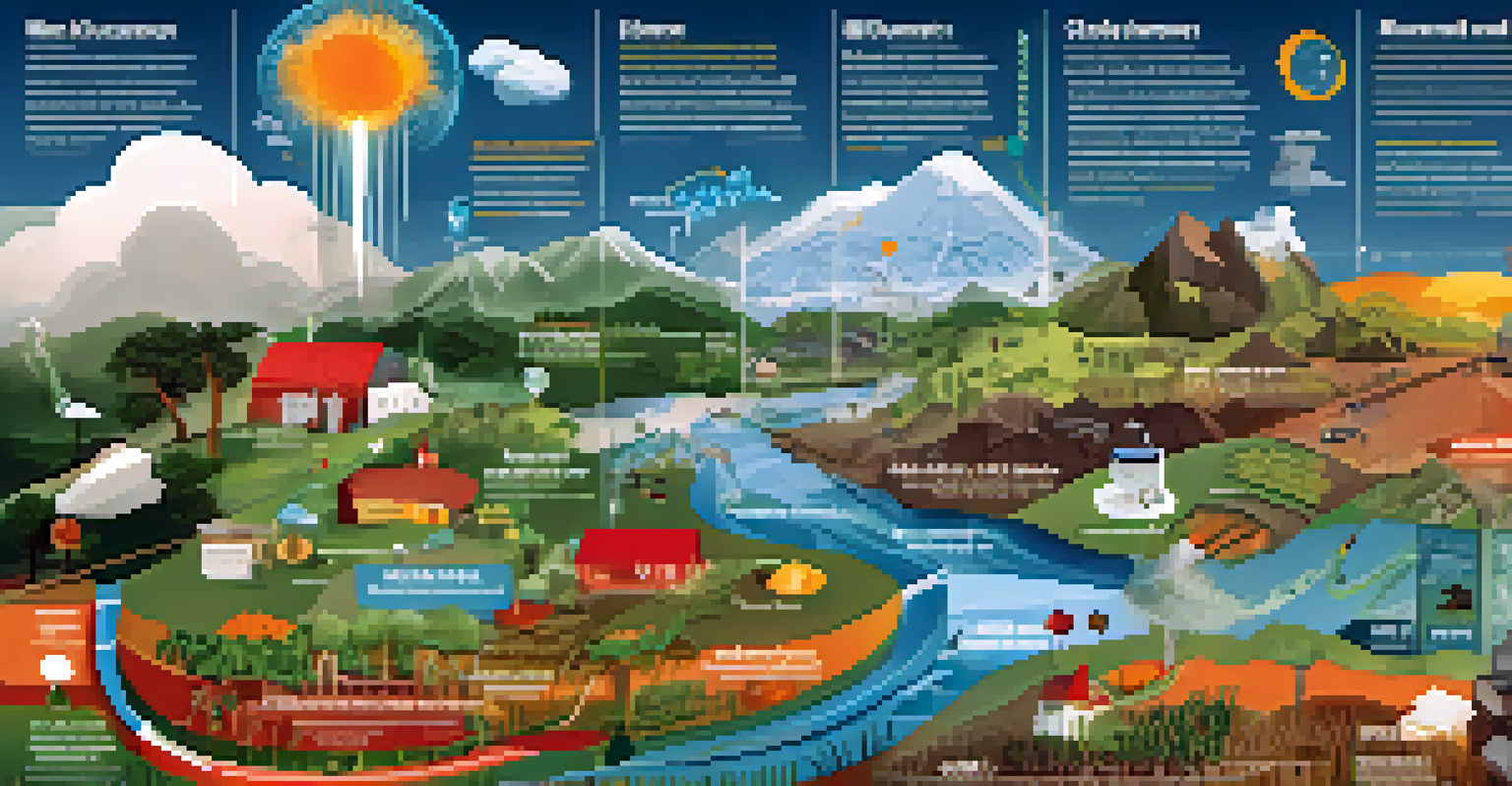Climate Change: Health Impacts and Naturopathic Adaptations

Understanding Climate Change and Its Health Risks
Climate change refers to long-term shifts in temperatures and weather patterns, mainly due to human activities. These changes can lead to more frequent and severe weather events, such as heatwaves, floods, and hurricanes. The health risks associated with climate change are significant, including respiratory problems, heat-related illnesses, and the spread of infectious diseases.
Climate change is no longer some far-off problem; it is affecting us now. We are already feeling its impact on our health, our economy, and our communities.
For instance, rising temperatures can exacerbate air pollution, leading to increased asthma and other respiratory issues. Meanwhile, the emergence of diseases like Lyme disease and West Nile virus is linked to changing ecosystems influenced by climate change. Understanding these risks is the first step in addressing the health impacts.
Moreover, vulnerable populations, such as the elderly and those with pre-existing health conditions, are at higher risk. Acknowledging the diverse effects of climate change on health can help us develop more effective strategies to mitigate these impacts.
Direct Health Impacts of Extreme Weather Events
Extreme weather events, like hurricanes and floods, pose immediate health risks through injuries and fatalities. Beyond physical injuries, these disasters can lead to mental health issues such as anxiety, depression, and post-traumatic stress disorder (PTSD). The psychological toll can linger long after the physical damage has been repaired.

For example, communities affected by Hurricane Katrina faced not only the destruction of homes but also a rise in mental health problems due to displacement and loss. Recognizing the emotional aftermath is crucial for providing comprehensive healthcare in the wake of such disasters.
Health Risks from Climate Change
Climate change poses significant health risks, including respiratory issues and the spread of infectious diseases.
In addition, extreme heat events can worsen pre-existing conditions, particularly cardiovascular and respiratory diseases. Understanding these direct impacts allows healthcare providers to tailor their responses to be more effective in protecting public health.
Indirect Health Effects of Climate Change
Climate change also has indirect health effects that may not be immediately obvious. Changes in climate can affect food security, leading to malnutrition and related health issues. For instance, droughts can reduce crop yields, while flooding can contaminate water supplies, impacting food safety and nutrition.
The greatest threat to our planet is the belief that someone else will save it.
Furthermore, as habitats change, so do the patterns of disease-carrying vectors, like mosquitoes and ticks. This shift can lead to increased incidences of vector-borne diseases, which can spread rapidly in new regions. Understanding these indirect effects is essential for comprehensive public health planning.
Addressing these indirect health impacts requires collaboration across various sectors, including agriculture, water management, and public health. By recognizing the interconnectedness of these challenges, we can better prepare for and respond to the health implications of climate change.
The Role of Naturopathy in Health Adaptations
Naturopathy emphasizes a holistic approach to health, making it a valuable ally in combating the health impacts of climate change. Naturopathic practitioners focus on prevention and treating the root causes of health issues, which is crucial in adapting to changing environmental conditions. By promoting healthy lifestyles, they can help mitigate the effects of climate change on individual health.
For example, incorporating herbal remedies and nutritional practices can enhance immunity and resilience against climate-related health issues. Naturopathy also encourages stress management techniques, which can be vital in coping with the mental health impacts of climate-related disasters.
Naturopathy Supports Resilience
Naturopathy promotes holistic health practices that can enhance individual resilience against climate-related health impacts.
Additionally, naturopathic medicine promotes community well-being through education and empowerment. By fostering a sense of agency and resilience, individuals can adapt better to the challenges posed by climate change.
Preventative Measures in Naturopathic Practices
Preventative measures are at the heart of naturopathic practices, making them essential in addressing climate-related health issues. This includes educating individuals about the importance of nutrition, physical activity, and mental health to build resilience. For instance, a diet rich in antioxidants can help combat oxidative stress caused by air pollution.
Moreover, naturopathy encourages regular health screenings and self-care practices to catch potential health problems early. This proactive approach can significantly reduce the long-term health effects associated with climate change, such as chronic diseases.
Incorporating seasonal and locally-sourced foods into diets not only supports individual health but also promotes sustainable agriculture. By aligning health practices with environmental stewardship, we can create a more resilient society.
Community Engagement and Naturopathic Solutions
Community engagement plays a critical role in naturopathic solutions to climate change health impacts. Building strong, health-focused communities can enhance collective resilience against climate-related challenges. Naturopathic practitioners often engage with local groups to share knowledge and resources, fostering a supportive network.
For example, community gardens promote local food production while encouraging physical activity and social interaction. These initiatives not only improve food security but also strengthen community bonds, which can be vital in times of crisis.
Community Engagement is Key
Building health-focused communities through engagement and education can improve resilience against the challenges posed by climate change.
Additionally, organizing workshops on sustainable practices and healthy living can empower community members. By working together, communities can adapt to the health impacts of climate change more effectively.
Future Directions: Integrating Naturopathy in Climate Health Strategies
As the impacts of climate change continue to unfold, integrating naturopathy into public health strategies becomes increasingly important. This integration can lead to a more resilient healthcare system that emphasizes prevention and holistic care. By recognizing the value of naturopathic medicine, we can enhance our response to climate-related health challenges.
Collaboration between naturopaths and conventional healthcare providers can create a more comprehensive approach to health. For example, shared resources and knowledge can lead to better patient outcomes and more effective community health strategies.

Looking ahead, advocating for policies that support integrative health practices can pave the way for a sustainable future. By prioritizing both human and environmental health, we can create a healthier world for generations to come.